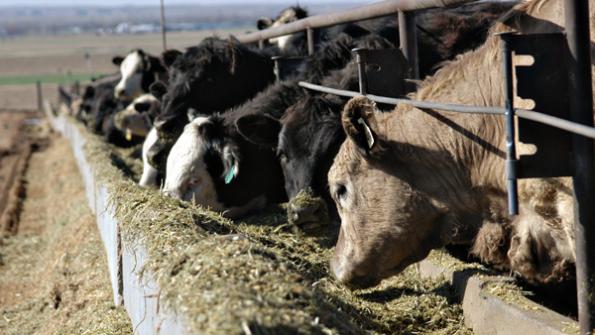
By Jordan Fabian, Michael Hirtzer and Mike Dorning
President Donald Trump raised the possibility of halting cattle imports to help an industry hit by slaughterhouse logjams. Ranchers say they’re more concerned about foreign beef than livestock.
Trump said Tuesday the U.S. should consider “terminating” trade deals that obligate the country to import cattle. He didn’t specify which trade deals he’s eying.
The largest American cattle trade group, the National Cattlemen’s Beef Association or NCBA, said Brazilian beef is the real threat, rather than livestock shipments. The issue has come up after thousands of workers at U.S. meat plants fell ill with coronavirus, prompting a drop in slaughtering that left some American ranchers without a market for their animals.
“We have trade deals where we actually take in cattle and we have a lot of cattle in this country and I think you should look at the possibility of terminating those trade deals,” Trump said in a speech to announce a $19 billion coronavirus-related farm bailout.
While the U.S. does import small amounts of cattle from Mexico and Canada, each of those neighboring countries also buys hundreds of millions worth of American meat. That’s all allowed under both NAFTA and the recently renegotiated USMCA trade deal.
Meanwhile, Brazilian meat producers including JBS SA not only own U.S. meat-packing plants but have said they will ramp up shipments of meat to the U.S. due to surging prices and tight supplies.
“Our concern isn’t with live cattle imports,” said Kent Bacus, senior director for international trade at the NCBA. “Our concern is how the administration has approved beef imports from countries that we don’t have trade agreements with, like Brazil.”
Bacus said less than 5% of cattle slaughtered every year are foreign born. “That is a small amount,” he said.
Australia exported a single cow to the U.S. in 2018, the last time the country imported live cattle from anywhere other than its two neighbors, according to Department of Agriculture data.
“There are some countries that are sending us cattle for many years and I think we should look at terminating,” Trump said. “We’re very self-sufficient and we’re becoming more and more self-sufficient.”
Canadian Reliance
Another industry group applauded Trump’s statement while calling for details.
“We’re keenly interested in knowing exactly what it means,” Bill Bullard, chief executive officer of Ranchers-Cattlemen Action Legal Fund, United Stockgrowers of America, which represents independent cattle producers, said by telephone.
Bullard said he was concerned because Trump had qualified his comments, suggesting he would allow continued imports from allies. Virtually all imported cattle comes from Canada or Mexico, he said.
“Those imports do displace domestically produced U.S. cattle” and have become an even greater problem as slaughterhouses close or reduce production because of coronavirus outbreaks among employees, he said.
The group said the USMCA failed to properly protect American ranchers.
Meat packers in the U.S. northwest rely on imports of Canadian cattle to maintain their efficiency and utilization rates, said Brian Perillat, a senior analyst at Calgary-based Canfax, the market analysis division of the Canadian Cattlemen’s Association. Canada is a net importer of feeder cattle from the U.S. after American herds expanded and Canada’s feedlot sector added capacity, he said.
Last year, Canada exported 11% of its fed cattle to the U.S. where they are processed into prime cuts of beef, Perillat said. An additional 20% of the nation’s cows and bulls were sent to U.S. plants to be turned into things like hamburger, he said.
“I just can’t stress enough how critical it is to both countries,” Perillat said by telephone. “If they actually stop importing cattle from us, it would hurt their own packing plants.”
--With assistance from Millie Munshi, Jen Skerritt, Josh Wingrove and Patrick McKiernan.
To contact the reporters on this story:
Jordan Fabian in Washington at [email protected];
Michael Hirtzer in Chicago at [email protected];
Mike Dorning in Washington at [email protected]
To contact the editors responsible for this story:
Alex Wayne at [email protected]
Joshua Gallu, James Attwood
© 2020 Bloomberg L.P.
Read more about:
Covid 19About the Author(s)
You May Also Like




